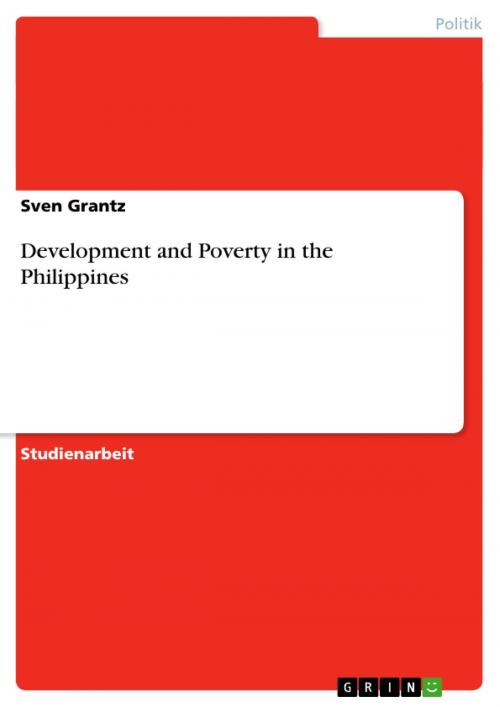| Author: | Sven Grantz | ISBN: | 9783640311033 |
| Publisher: | GRIN Verlag | Publication: | April 14, 2009 |
| Imprint: | GRIN Verlag | Language: | German |
| Author: | Sven Grantz |
| ISBN: | 9783640311033 |
| Publisher: | GRIN Verlag |
| Publication: | April 14, 2009 |
| Imprint: | GRIN Verlag |
| Language: | German |
Studienarbeit aus dem Jahr 2009 im Fachbereich Politik - Internationale Politik - Thema: Entwicklungspolitik, Note: 1.0, Westfälische Wilhelms-Universität Münster (Institut für Politikwissenschaft), Sprache: Deutsch, Abstract: An 'anti-development state', that is how Walden Bello, professor at the University of the Philippines, describes the Philippines in his latest book (Bello 2006). This paper seeks to examine if this harsh statement is reflected in the available data on economic development and poverty reduction. The first part explores the Philippines' record of economic and human development. It uses a comparative approach by benchmarking with the neighbor countries Indonesia and Thailand. The second part takes a look at the Philippines' achievements in poverty reduction and once again compares them with those of its neighbors. Finally, a number of key factors in poverty reduction are identified and recommendations are given for an improved pro-poor growth. The goal of this paper is to provide comprehensive background information on the frame conditions for poverty-oriented development cooperation with the Philippines. It also seeks to evaluate to what extend the current administration of President Gloria Macapagal-Arroyo was able to accomplish its self-set goals of inclusive growth and poverty reduction. The underlying Philippine government's Medium-Term Development Plan (MTDP) is prepared every six years to coincide with the term of the president. It sets out the administration's development and poverty reduction goals. The MDTP 2004-2010 sets the goal to fight poverty by building prosperity for the greatest number of Filipino people. The specific target is to reduce poverty incidence of families to 17.9% in 2010. Furthermore, the collected data should serve as a basis for further research.
Studienarbeit aus dem Jahr 2009 im Fachbereich Politik - Internationale Politik - Thema: Entwicklungspolitik, Note: 1.0, Westfälische Wilhelms-Universität Münster (Institut für Politikwissenschaft), Sprache: Deutsch, Abstract: An 'anti-development state', that is how Walden Bello, professor at the University of the Philippines, describes the Philippines in his latest book (Bello 2006). This paper seeks to examine if this harsh statement is reflected in the available data on economic development and poverty reduction. The first part explores the Philippines' record of economic and human development. It uses a comparative approach by benchmarking with the neighbor countries Indonesia and Thailand. The second part takes a look at the Philippines' achievements in poverty reduction and once again compares them with those of its neighbors. Finally, a number of key factors in poverty reduction are identified and recommendations are given for an improved pro-poor growth. The goal of this paper is to provide comprehensive background information on the frame conditions for poverty-oriented development cooperation with the Philippines. It also seeks to evaluate to what extend the current administration of President Gloria Macapagal-Arroyo was able to accomplish its self-set goals of inclusive growth and poverty reduction. The underlying Philippine government's Medium-Term Development Plan (MTDP) is prepared every six years to coincide with the term of the president. It sets out the administration's development and poverty reduction goals. The MDTP 2004-2010 sets the goal to fight poverty by building prosperity for the greatest number of Filipino people. The specific target is to reduce poverty incidence of families to 17.9% in 2010. Furthermore, the collected data should serve as a basis for further research.















